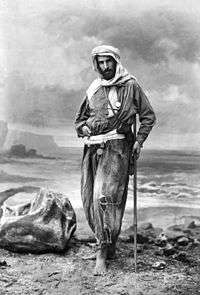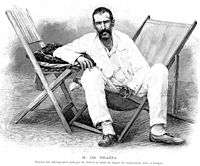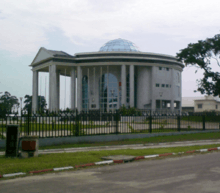Pierre Savorgnan de Brazza

Pietro Paolo Savorgnan di Brazzà, then known as Pierre Paul François Camille Savorgnan de Brazza (26 January 1852 – 14 September 1905), was an Italian explorer and freemason,[1][2][3] born in the Papal States and later naturalized as a Frenchman. With the backing of the Société de Géographie de Paris, he opened up for France entry along the right bank of the Congo that eventually led to French colonies in Central Africa. His easy manner and great physical charm, as well as his pacific approach among Africans, were his trademarks. Under French colonial rule, the capital of the Republic of the Congo was named Brazzaville after him and the name was retained by the post-colonial rulers.
Early years


Born in Castel Gandolfo, near Rome, Pietro Savorgnan di Brazzà was the seventh son of Count Ascanio Savorgnan di Brazzà, a nobleman of Udine with many French connections, and his wife Giacinta Simonetti. Pietro was interested in exploration from an early age and won entry to the French naval school at Brest. He graduated as an ensign and sailed on the French ship Jeanne d'Arc to Algeria.
Exploration in Africa
Brazza first encountered Africa in 1872, while sailing on an anti-slavery mission near Gabon.[4] His next ship was the Vénus, which stopped at Gabon regularly and in 1874 Brazza made two trips, up the Gabon and Ogooué rivers. He then proposed to the government that he explore the Ogooué to its source. With the help of friends in high places, including Jules Ferry and Leon Gambetta, he secured partial funding, the rest coming out of his own pocket. He also became a naturalized French citizen at this time, adopting the French spelling of his name.
In this expedition, which lasted from 1875–1878, 'armed' only with cotton textiles and tools to use for barter, and accompanied by Noel Ballay, a doctor, naturalist Alfred Marche, a sailor, thirteen Senegalese laptots and four local interpreters, Brazza charmed and talked his way deep inland.
The French authorized a second mission, 1879-1882. By following the Ogoue River upstream and proceeding overland to the Lefini River and then downstream, Brazza succeeded in reaching the Congo River in 1880 without encroaching on Portuguese claims. He then proposed to King Makoko of the Batekes that he place his kingdom under the protection of the French flag. Makoko, interested in trade possibilities and in gaining an edge over his rivals, signed the treaty. Makoko also arranged for the establishment of a French settlement at Mfoa on the Congo's Malebo Pool, a place later known as Brazzaville; after Brazza's departure, the outpost was manned by two Laptots under the command of Senegalese Sergeant Malamine Camara, whose resourcefulness had impressed Brazza during their several months trekking inland from the coast. During this trip he encountered Stanley near Vivi. Brazza did not reveal that he just signed up Makoko - it took Stanley some months to realise that he had been beaten in the 'race' (set by his sponsor King Léopold).
In 1883,[5] Brazza was named governor-general of the French Congo in 1886. He was dismissed in 1897 due to poor profitability of the colony and journalist reports of conditions for the natives that some would say were "too good."
By 1905, stories were reaching Paris of injustice, forced labour and brutality by the Congo's new governor, Emile Gentil in laissez-faire conjunction with the new concession companies set up by the French Colonial Office and condoned by Prosper Philippe Augouard, Catholic Bishop of the Congo. Brazza was sent to investigate and the resulting report was revealing and damning, in spite of many obstructions placed in his path. When his deputy Félicien Challaye placed the embarrassing report in front of the National Assembly, it was suppressed and those oppressive conditions remained in the French Congo for decades.
Death and memorials
The last tour of the Congo took a hard physical toll of Brazza, and on his return journey to Dakar he died of dysentery and fever (amid rumours that he had been poisoned). His body was repatriated to France and he was given a state funeral at Sainte-Clotilde, Paris, prior to interment at the cemetery of Père Lachaise. His widow, Thérèse, dissatisfied with the politicians' subsequent behaviour, had his body exhumed and reinterred in Algiers (capital of present-day Algeria).[6] The epitaph for his burial site in Algiers reads: "une mémoire pure de sang humain" ("a memory untainted by human blood").
Brazzaville Mausoleum

In February 2005 Presidents Nguesso of Congo, Ondimba of Gabon and Chirac of France gathered at a ceremony to lay the foundation stone for a memorial to Pierre de Brazza, a mausoleum of Italian marble.[7]
On 30 September 2006, de Brazza's remains were exhumed from Algiers[8] along with those of his wife and four children.[9] They were reinterred in Brazzaville on 3 October in the new marble mausoleum which had been prepared for them and had cost some 10 million dollars. The ceremony was attended by three African presidents and a French foreign minister, who paid tribute to his humanitarian work against slavery and the abuse of African workers.
Mausoleum's controversy
The decision to honor de Brazza as a founding father of the Republic of the Congo has elicited protests among some Congolese, questioning the best use of the money and why a colonizer should be revered as a national hero instead of the Congolese who fought against colonization. The Congolese historian professor Théophile Obenga stated that in honoring de Brazza, the government disregarded salient information, including an account of de Brazza's rape of a Congolese woman passed down by oral tradition.[10]
Equipment
De Brazza had several custom made pieces of equipment for his trips, one of them being a foldable camp bed. He asked the French company Louis Vuitton to make a bed for his travels and the company manufactured a case which, when opened and unfolded, would transform into a camp bed.
Notes
- ↑ Initiated at "Alsace-Lorraine" lodge of Paris, on 1888 june 26th (Dictionnaire de la Franc-maçonnerie, page 163, Daniel Ligou, Presses Universitaires de France, 2011)
- ↑ Ce que la France doit aux francs-maçons (Laurent KUPFERMAN and Emmanuel PIERRAT, ed. Grund, 2012)
- ↑ La franc-maçonnerie, Page 26 (Jean Massicot, ed. Desnoël, 2010)
- ↑ http://harvardmagazine.com/1997/01/vita.html
- ↑ Histoire militaire des colonies, pays de protectorate et pays sous mandat. 7. "Histoire militaire de l'Afrique Équatoriale française". 1931. Accessed 9 October 2011. (French)
- ↑ Brazza’s death ministère de la culture et de la communication de France
- ↑ "quite a gallery of rogues - none of the protagonists at this grotesque ceremony cared much about the people of Africa - two years later both the African Presidents were being investigated for having embezzled millions of euros of public funds and used illicit payments from the French oil company Elf to acquire lavish properties on the Cote d'Azur and channel money into the pockets of French politicians." 'Julian Jackson', BBC Radio 3, The Other Empire, episode 2/5, first broadcast 13 September 2011
- ↑ Africa explorer's remains exhumed, BBC News, 30 September 2006.
- ↑ African nation builds £1.4m marble mausoleum for colonial master, The Guardian, 4 October 2006
- ↑ Florence Bernault, "Colonial Bones: The 2006 burial of Savorgnan de Brazza in the Congo", African Affairs Vol 109 Issue 436 pages 367-390, http://afraf.oxfordjournals.org/content/109/436/367.full?keytype=ref&ijkey=TalHYOsg7SzHRJc Accessed January 12, 2011
References
- Maria Petringa, Brazza, A Life for Africa, Bloomington, IN: AuthorHouse, 2006, ISBN 978-1-4259-1198-0
- Thomas Pakenham, The Scramble for Africa (1991)
- Richard West, Brazza of the Congo Victorian & Modern History Book Club (1973)
- Emanuela Ortis - "Pierre Savorgnan de Brazza: heròs du Friul" (2003) Radici n.9
- Théophile Obenga - Pierre Savorgnan de Brazza à la cour royale du Makoko,
- Congolese reaction to the Mausoleum controversy http://globalvoices.org/2006/10/09/Congo-brazzaville-should-a-colonizer-be-honored-like-a-founding-father/
External links
| Wikisource has the text of the 1911 Encyclopædia Britannica article Brazza, Pierre Paul François Camille Savorgnan de. |
- "Final return to Congo". BBC News. 2006-09-23. Retrieved 2008-08-06., BBC News, 23 September 2006
- A site dedicated to Brazza's life and times (in French, Italian and English)
- Fondation Pierre Savorgnan de Brazza (in French)
- Maria Petringa's 1997 "Brief Life of a Lover of Africa", a short biography of Savorgnan de Brazza with one of Paul Nadar's famous photos of the explorer
- Congolese reaction to the Mausoleum controversy ( in French and English)
|